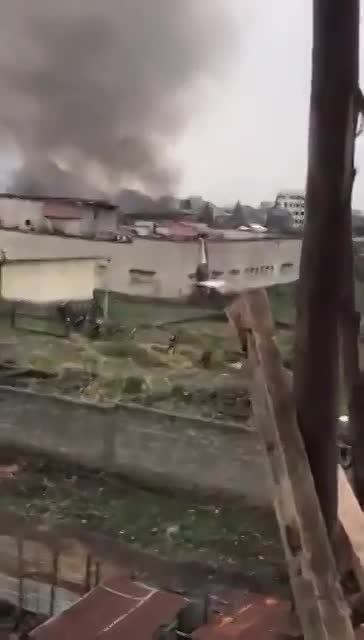Horror in Goma: Over 100 Women Raped and Burned Alive During DR Congo Prison Break Says UN
A catastrophic human rights tragedy has unfolded in the city of Goma, where more than 100 female prisoners were raped and burned alive during a violent jailbreak at Munzenze Prison. The horrific incident occurred last Monday following an assault by the M23 rebel group, which has been advancing rapidly through eastern DR Congo.
According to an internal United Nations (UN) report, between 165 and 167 women were brutally assaulted by male inmates after rebels breached the prison’s security.
The report states that many of these women were later killed when the attackers set the prison on fire. Although this report has not independently been verified, the scale of the violence has drawn international condemnation.
Goma, home to over one million people, descended into chaos after the Rwanda-backed M23 rebels captured the city. Witnesses reported bodies lying uncollected in the streets, constant gunfire, and thick black smoke billowing from the burning prison.
Video footage circulating on social media shows terrified prisoners fleeing the inferno, while others, believed to be escapees, were seen wandering through the city’s streets.
Amateur Video Clip
The UN estimates that at least 2,900 people have died in the latest wave of violence, with 2,000 bodies already buried and 900 more awaiting identification in city morgues. The death toll is expected to rise as fighting intensifies.
While M23 rebels announced a ceasefire earlier this week, purportedly for humanitarian reasons, fighting resumed shortly after. Sources report that the rebels have now seized control of Nyabibwe, a mining town approximately 100 kilometers from Bukavu, the second-largest city in eastern DR Congo. Bukavu is believed to be the rebels’ next target, prompting Congolese authorities to recruit hundreds of civilian volunteers to defend the city.
The rebels’ rapid territorial gains have heightened fears of further atrocities. In addition to the immediate human toll, the conflict is exacerbating an already dire humanitarian crisis.
The violence has severely disrupted access to clean water, raising concerns about an impending cholera outbreak. Stephan Goetghbuer, regional lead for Médecins Sans Frontières (MSF), warned:
“Access to water has been cut for days, corpses have been lying in the streets, and waterborne diseases such as cholera are a real threat. Some of our cholera treatment centers are full and have been expanded to cope with the crisis.”
The situation is further complicated by the withdrawal of peacekeeping forces. Malawi has announced plans to pull out its troops following the deaths of three soldiers in the recent fighting. These soldiers were part of a Southern African Development Community (SADC) force led by South Africa, which has also suffered significant losses. Despite this, South African President Cyril Ramaphosa has vowed to keep his troops deployed in the region.
The conflict has strained relations between DR Congo and its neighbors, particularly Rwanda, which is accused of supporting M23 rebels—a claim Kigali has consistently denied. The growing regional tensions risk destabilizing the wider Great Lakes region, as diplomatic efforts to broker peace have so far yielded little progress.
As Goma remains under rebel control, its residents are trapped in a city marked by fear, violence, and uncertainty. International organizations are calling for urgent action to protect civilians and address the humanitarian disaster unfolding in the region.
The tragedy at Munzenze Prison is a stark reminder of the human cost of the ongoing conflict in DR Congo. Human rights groups are urging the international community to respond decisively, both to prevent further atrocities and to support
Join the Daily West Nile WhatsApp group now to never miss an update from us.Download Host Media Now from the Play Store to watch HostTV, listen to Host Rad
